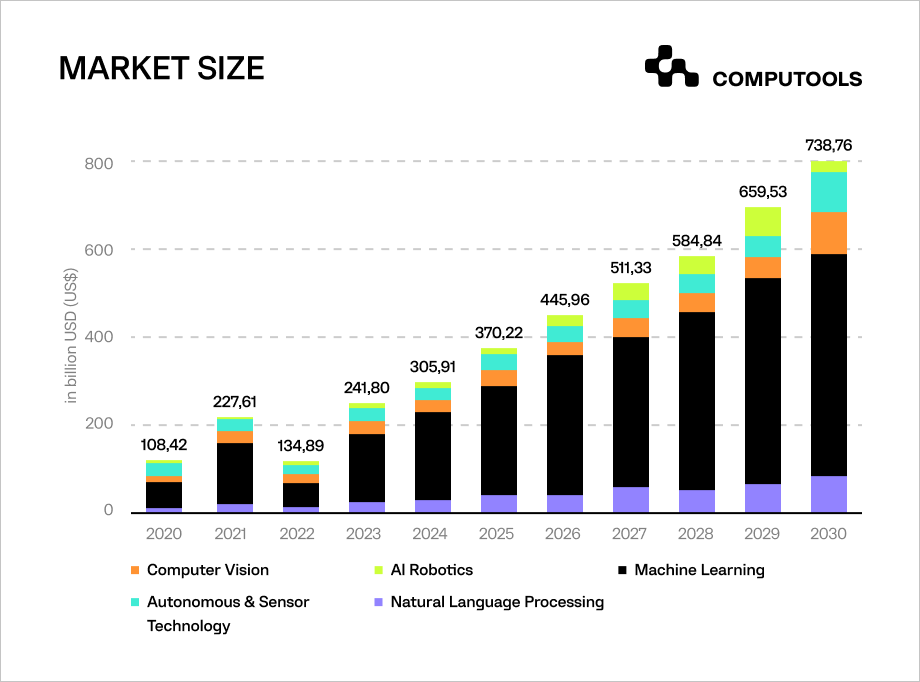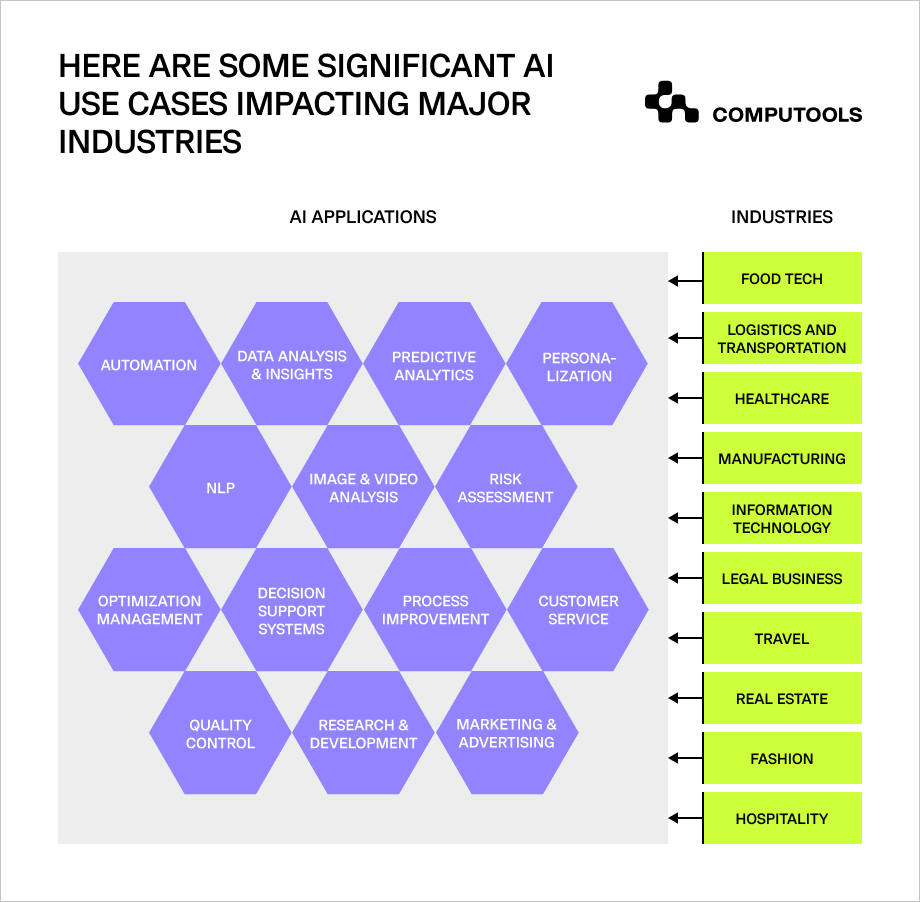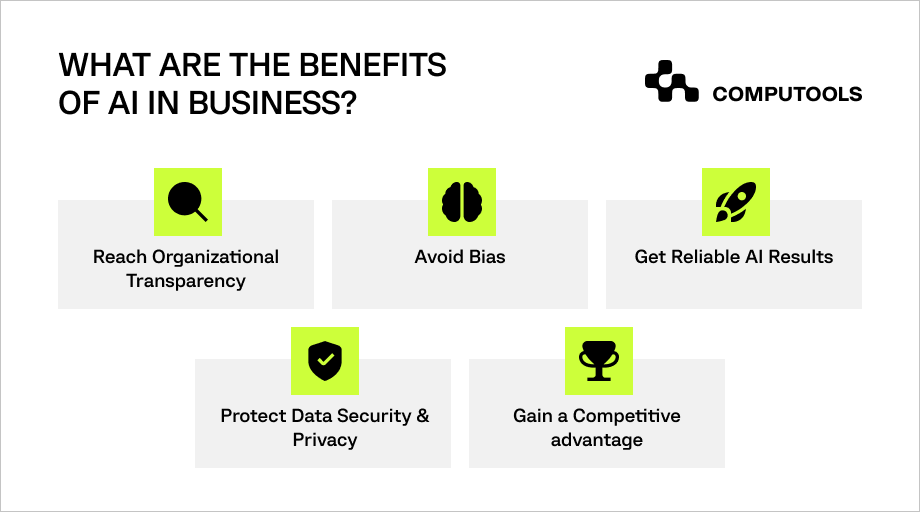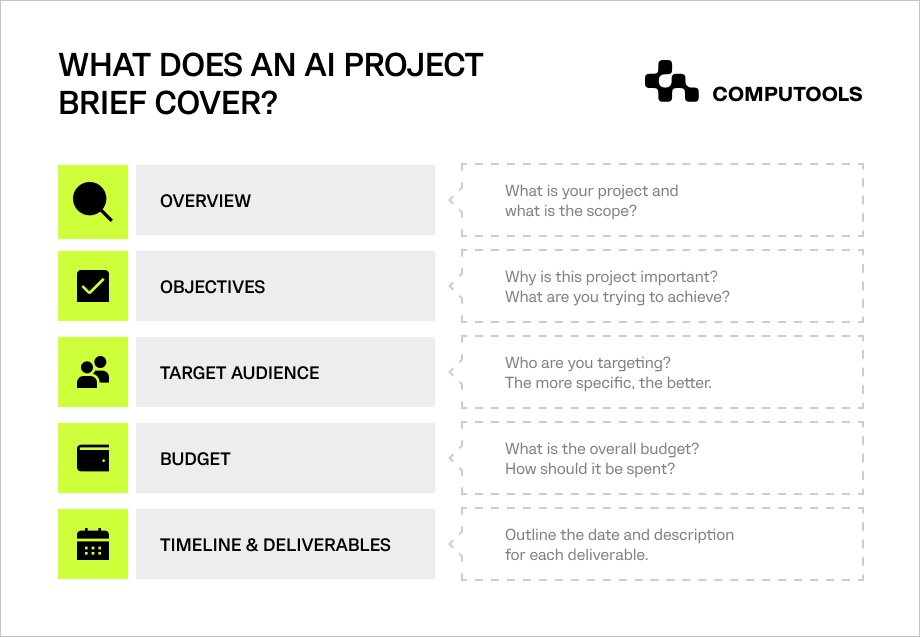Artificial intelligence is reshaping industries and creating a demand for a reliable AI development company. Whether we’re talking about healthcare diagnostic tools, financial services with fraud detection algorithms, or manufacturing incorporating robotic process automation, AI applications continue to expand their influence across diverse sectors.
As per Statista, the AI market is expected to reach US$241.80 billion in 2023 and surge to US$738.80 billion by 2030. Given the widespread use and adaptability of AI technologies, these figures are hardly surprising.

In the medical field, AI is revolutionising diagnostics and treatment plans, with an anticipated expansion of the AI sector in healthcare by up to US$36.1 billion by 2025. Healthcare providers actively employ machine learning algorithms and image recognition technologies for tasks like medical image analysis, pathology interpretation and personalised treatment recommendations.
These tools not only speed up medical processes but also notably improve precision and accuracy in patient care.
In finance, AI-powered algorithms play an active role in reshaping risk management and fraud detection. By 2025, 43% of companies within the financial sector are projected to embrace AI technologies as a crucial component of their business processes.
Education is also actively transforming with the integration of AI applications. E-learning is actively enhancing personalised experiences and improving educational outcomes. Among students using AI, particularly ChatBots, 68% express the belief that it has positively impacted their academic grades.
AI-powered tools are increasingly employed to tailor educational content to individual needs, providing adaptive learning experiences, and assisting educators in delivering more personalised instruction.
The integration of AI extends beyond these sectors, reaching into agriculture, transportation and various others. These statistics underscore the broad acceptance of AI, influencing the future technological landscape of businesses worldwide.
In this article, you’ll discover how AI development services can revolutionise your business and explore tips for selecting the perfect AI partner for your digital journey.

Implementing AI Solutions in Business
Artificial intelligence has a notable influence globally, and as mindful decision-makers, it’s essential to investigate ways to employ it if you want to enhance business operations and improve customer experiences. Let’s discover how AI solutions for business transform workflows all over the world.
Benefits of AI in Business
Artificial intelligence has expanded the capabilities of computer systems, making our daily lives more convenient and easier. In a recent article, Forbes highlighted essential AI benefits for business, and we’ll focus on the most important ones.
1. Task Automation
AI allows for the automation of repetitive tasks in various areas, including data collection and entry, email responses and software testing. This helps employees to concentrate on tasks that demand human abilities.
2. Error Reduction
AI models rely on predictive analysis, eliminating the possibility of mistakes and contributing to a more reliable and accurate execution of business processes.
3. Workflow Improvement
AI’s optimization capabilities extend to improving workflows, simplifying processes and, ultimately, increasing productivity within the business environment.
4. Continuous Operation
AI-based systems are available 24/7 and can be accessed whenever needed at any given time. Unlike humans, AI-based systems can remain productive continuously.
5. Big Data Management
AI has the algorithms to quickly process and draw conclusions from large datasets in a short amount of time. It can rapidly understand and extract relevant data needed for analysis.

Industry Examples
AI offers numerous applications across various industries and focal points. As indicated by McKinsey’s research, approximately 55% of companies have implemented certain types of AI tools or resources. Here are a few examples illustrating how AI is actively used in real life.
1. Speech Recognition
Speech recognition technology enables devices to understand human speech, especially for voice searches. The most obvious example is Google’s Voice Search. The tool not only improves the user experience but also makes the internet more accessible to a broader audience.
With the proper AI solution provider, voice interactions contribute to user loyalty and have the potential to boost conversion rates, making it a valuable addition for businesses integrating such technology.
2. Customer Service
AI has a significant effect on customer service, as seen through tools such as chatbots or virtual agents. These AI-driven tools effectively handle customer questions, offer personalised suggestions, and respond to FAQs without instant human involvement.
Facebook uses chatbots to improve user interactions on its platform. Bots help with different tasks, including offering information and resolving problems, improving overall customer support.
3. AI Apps
Companies invest in AI app development to create intelligent products that adapt, learn and provide personalised services. A notable example is Spotify.
By analysing user listening habits, preferences, and behaviour, Spotify suggests tailored playlists and music recommendations. Using AI strategies in apps not only keeps users more engaged but also helps companies to create better marketing strategies, leading to business growth.

Computools
Software Solutions
Computools is an IT Consulting and Custom Software Development Company that designs solutions to help companies meet the needs of tomorrow. Our clients represent a wide range of industries, including retail, finance, healthcare, consumer service, logistics and more.
Choosing an AI Development Company
Choosing to work with an AI development services provider is a significant decision that requires careful consideration. An AI expert from such a company not only helps in creating advanced algorithms but also plays a main part in thoroughly analysing your data.
Let’s explore the main reasons for prioritising this collaboration:
1. AI Technologies Proficiency
Specialised companies have a deep understanding of various AI technologies, frameworks and algorithms, ensuring the use of the most suitable and up-to-date solutions for your projects.
2. Tailored AI Solutions
By partnering with an AI company, you gain access to personalised AI solutions carefully designed to address the unique challenges and needs of your business.
3. Prompt Access to Quality Data
Vendors provide quick access to high-quality data sets and the necessary resources needed to build robust machine learning and deep learning models.
4. Additional Strategic Advantages
AI development stimulates faster time-to-market, which is important when dealing with substantial data volumes that require efficient handling and processing.
Guide to Choosing an AI Development Company
When picking the right AI company, a few important things can affect the success of the whole project. Following these tips will help you to find a skilled partner that can meet your specific needs and expectations.
1. Define your needs
Before initiating your quest for an AI development team, you need to gain a thorough understanding of your project’s objectives, scope and needs.
Whether you want to build an advanced data analytics platform or a virtual reality application, outlining your project’s specifics is a must for seamless communication with potential development partners.
2. Evaluate candidates’ Experience
Before hiring a company, assess their experience and skills. Choose a reputable partner with a proven track record of completing AI development projects similar to your business requirements.
You can examine its portfolio and learn case studies. This information will provide insights into its previous work and experience.
When doing this, pay closer attention to:
• the team’s skills
• the problems it solved for clients
• AI technologies it worked with
• how the team approaches the development process
3. Check the reviews
A company’s reviews and client testimonials offer even more authentic insight into their work compared to case studies. While a portfolio can be overly positive, third-party reviews are beyond the company’s influence. They provide a glimpse into the client’s perspective on working with a company.
The primary source for reviews and testimonials is the company’s website. However, it’s important to note that these reviews are carefully selected, and negative feedback may not be showcased. For the most reliable reviews, turn to B2B websites such as Clutch, G2 and Goodfirms.
4. Assess Technical Expertise
To ensure effective development, it’s necessary to consider a company’s diverse technical skills and subject matter expertise. Look for a partner with proven experience in machine learning, data analysis, algorithm design and other relevant AI technologies.
When assessing expertise, also look for familiarity with common AI frameworks like TensorFlow, PyTorch, Scikit-learn and Keras. While experts might not use all, expertise in 2 to 3 different AI frameworks is a positive indicator.
Another factor, AI infrastructure, also significantly influences the ROI of AI projects. Confirm the availability of essential resources, such as AI tools and hardware. Therefore, assess resource availability and evaluate the flexibility and scalability of the infrastructure.
5. Evaluate project management
Effective project management and transparent communication are key elements of successful development projects. Enquire about the company’s management processes, its communication platforms, how it handles milestones and how it ensures the project stays on track.
Conduct interviews to create a connection between your business and a tech team. Clear and consistent communication ensures that you stay informed about the progress and any potential roadblocks.
6. Explore security measures
When selecting a reliable AI development provider, take into consideration its cybersecurity measures. Given that artificial intelligence represents a substantial investment, even a minor compromise in security can lead to severe consequences.
Stay updated on the latest trends in cloud computing, especially those that facilitate the integration of services offering the scalability necessary for handling vast amounts of data.
7. Evaluate Pricing
Before making a final decision, carefully assess the company’s pricing structure and its alignment with your budget and needs. Furthermore, consider various factors influencing the cost of AI development, such as the design and complexity of the AI model.
Choose a fixed-price model for simple projects with clearly defined requirements. And if your project is more complex, consider a time and materials model. It offers flexibility and ensures the highest quality, scalability and control over the project.
Crafting an Effective Brief for Your AI Project
A project brief is a summary that outlines your AI software development objectives and how you plan to achieve them. Depending on how complicated your project is, it might be concise, just a few paragraphs, or more detailed, extending to a few pages.
Creating a brief requires a careful balance. You shouldn’t replicate your entire project plan, but you need to include enough elements to keep the document meaningful. Here are some useful tips that might help you.
1. Start with a summary
Provide a brief overview of the project’s description, purpose and the issue it aims to solve. Include essential details about your company, like name, contact information and a general budget.
2. Outline your objectives
List your main goals and how they fit into the broader plan. You don’t have to mention every deliverable, but provide enough information for your vendor to quickly grasp important milestones.
3. Establish a timeline
Create a realistic timeline for the project, including key milestones. Consider factors that may impact the timeline and build flexibility.
4. Define the target audience
Consider who the AI products are intended for. Describe their characteristics, behaviours, and expectations.
5. Provide technical details
Provide specifications like preferred programming languages, frameworks or platforms. Specify any integration requirements with existing systems.
6. Describe the evaluation process
Outline the criteria you will use to evaluate the success of the AI development solutions. Define key performance indicators (KPIs) and metrics.
7. Specify the responsibilities
Successful collaboration depends on clarity. Mention the roles of your team members and those of the AI development vendor. Clarify communication channels and frequency of updates.

Conclusion
Discovering the appropriate AI development company can be a complex undertaking, yet it forms the foundation for future success. Therefore, do not overlook this crucial step.
When choosing an AI vendor, remember to evaluate its ability to allocate necessary resources, its history in developing AI products, its familiarity with your industry, technical expertise, and its capability to craft an ideal AI solution tailored to your specific business needs. Good luck!
For additional information or assistance with AI software development, reach out to us at info@computools.com.











Computools was selected through an RFP process. They were shortlisted and selected from between 5 other suppliers. Computools has worked thoroughly and timely to solve all security issues and launch as agreed. Their expertise is impressive.